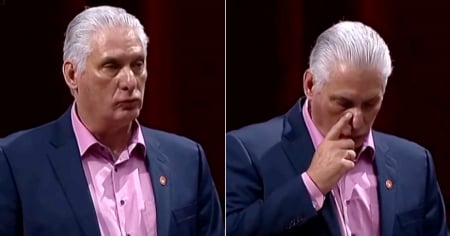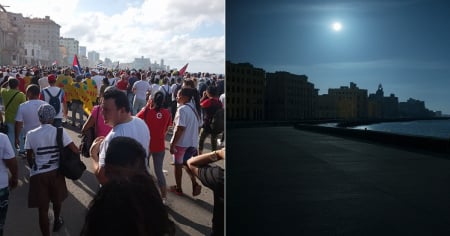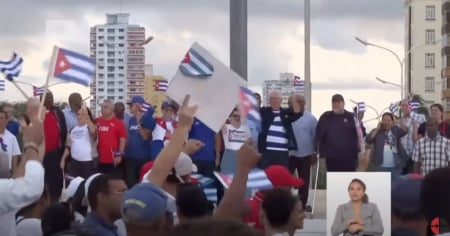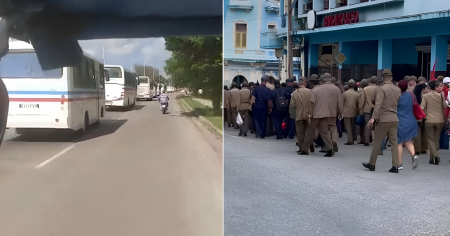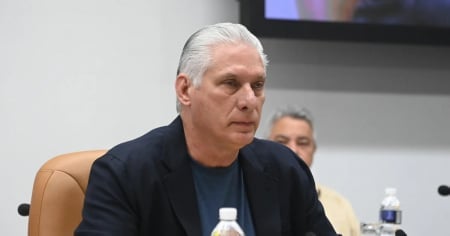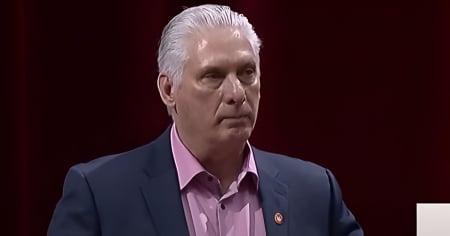The ruling Miguel Díaz-Canel stated at the closing of the National Assembly of People's Power that Cubans are heroes who are "in the fight and without crying."
In a new speech filled with the same empty slogans he has been repeating for years, he affirmed that millions of Cubans make up the body and soul of "a revolution that resists and is constantly reinventing itself."
"If someone asks them what they are up to, they will say they are in the struggle, in the fight, fighting hard, without crying, without kneeling..." he expressed.
In his speech, which included moments where he emphasized grandiloquent phrases followed by pauses for deputies to applaud, Díaz-Canel once again blamed the problems in Cuba on the United States, rather than acknowledging that his administration has been ineffective.
In the midst of the worst economic crisis in Cuban history, which has led many of his fellow citizens to hunger, he comments that Cuban children are "always cheerful," even as the number of minors who have to take to the streets to sell things to help their parents continues to rise.
It also praised the workers who "full of courage" repair a boiler at a thermal power plant or raise a pole knocked down by a hurricane, without mentioning that the deterioration these plants suffer after years of overexploitation is due to the fact that their government has not taken care to modernize them, as it is solely focused on building hotels.
For Díaz-Canel, heroes are "the family ironing the school shirt by any means necessary, and standing at all hours in front of the pots in the house." However, he did not clarify whether they are spending all that time in front of the pots waiting for the power to come back on or pondering what to put in them.
Finally, he praised those who "do not bitterly resent" when something goes wrong, as they focus on finding solutions.
Just a few minutes earlier, he had taken aim at his compatriots who criticize him on social media, accusing them of being part of a campaign against the revolution.
"It is embarrassing to see Cubans, both men and women, who were born, grew up, and trained professionally here, as they express hatred, anger, and contempt towards the nation that shaped them, as if they felt part of the chaotic and brutal North that looks down on them," he stated.
According to what he said, it is no longer possible to browse the Internet without encountering an avalanche of obscenities, insults, offenses, and lies, designed to denigrate those in positions of authority.
Frequently Asked Questions about Díaz-Canel's Speech and the Crisis in Cuba
What did Díaz-Canel say about Cubans in his recent speech?
Díaz-Canel stated that Cubans are heroes who are "in the fight and without tears," emphasizing their resilience in the face of adversity. However, he blamed the United States for the island's problems, sidestepping criticism regarding his administration and the economic crisis that Cuba is experiencing.
How does Díaz-Canel justify the crisis in Cuba?
Díaz-Canel primarily blames the United States' economic blockade for the crisis in Cuba. According to him, this blockade is the main cause of the economic and energy difficulties facing the country, although many critics point to the lack of management and internal reforms as key factors in the crisis.
What is the "creative resistance" proposed by Díaz-Canel?
The "creative resistance" is a strategy proposed by Díaz-Canel to confront the crisis in Cuba, rooted in rebellion, strength, and innovation. However, this proposal has faced criticism for lacking practical and effective measures to address the country's structural issues.
How has the Cuban population reacted to Díaz-Canel's statements?
The Cuban population has increasingly expressed discontent and skepticism towards Díaz-Canel's statements. Many citizens feel that the government's rhetoric is disconnected from reality, and that the promises of improvements lack a clear action plan, which has been reflected in protests and criticism on social media.
Filed under:

